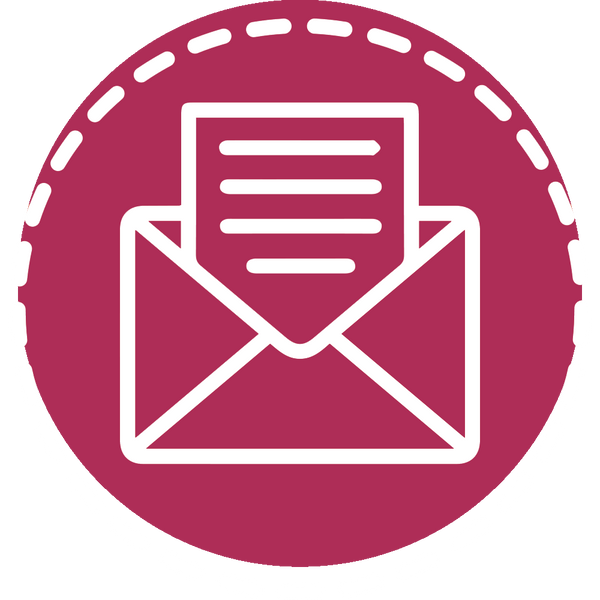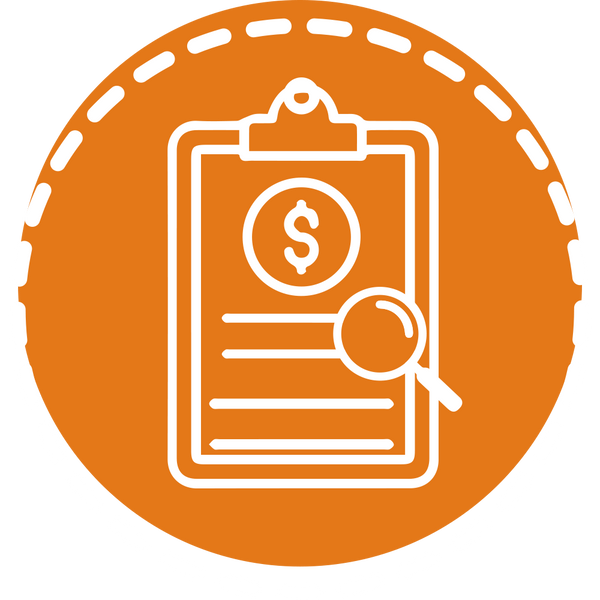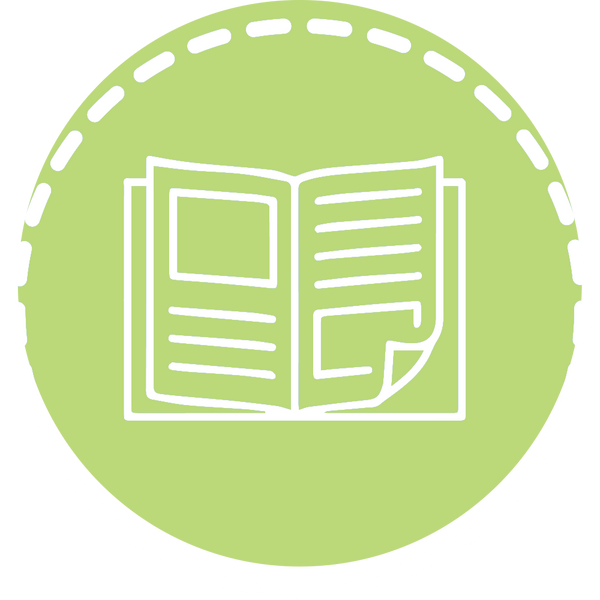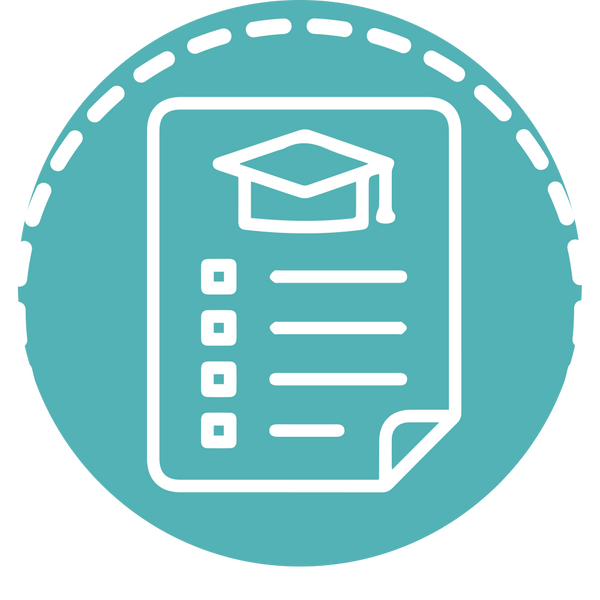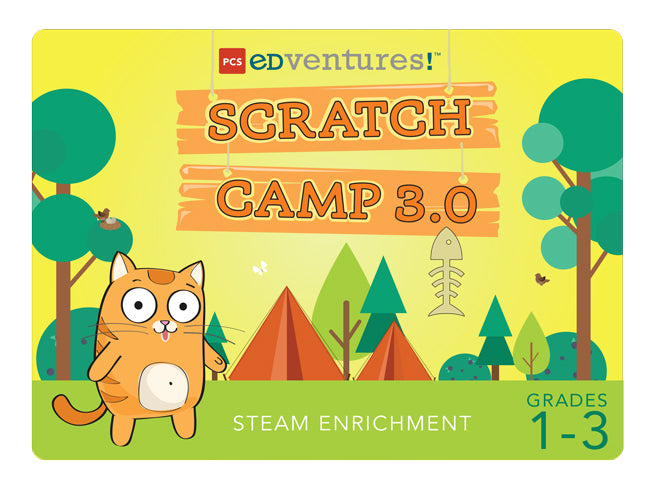
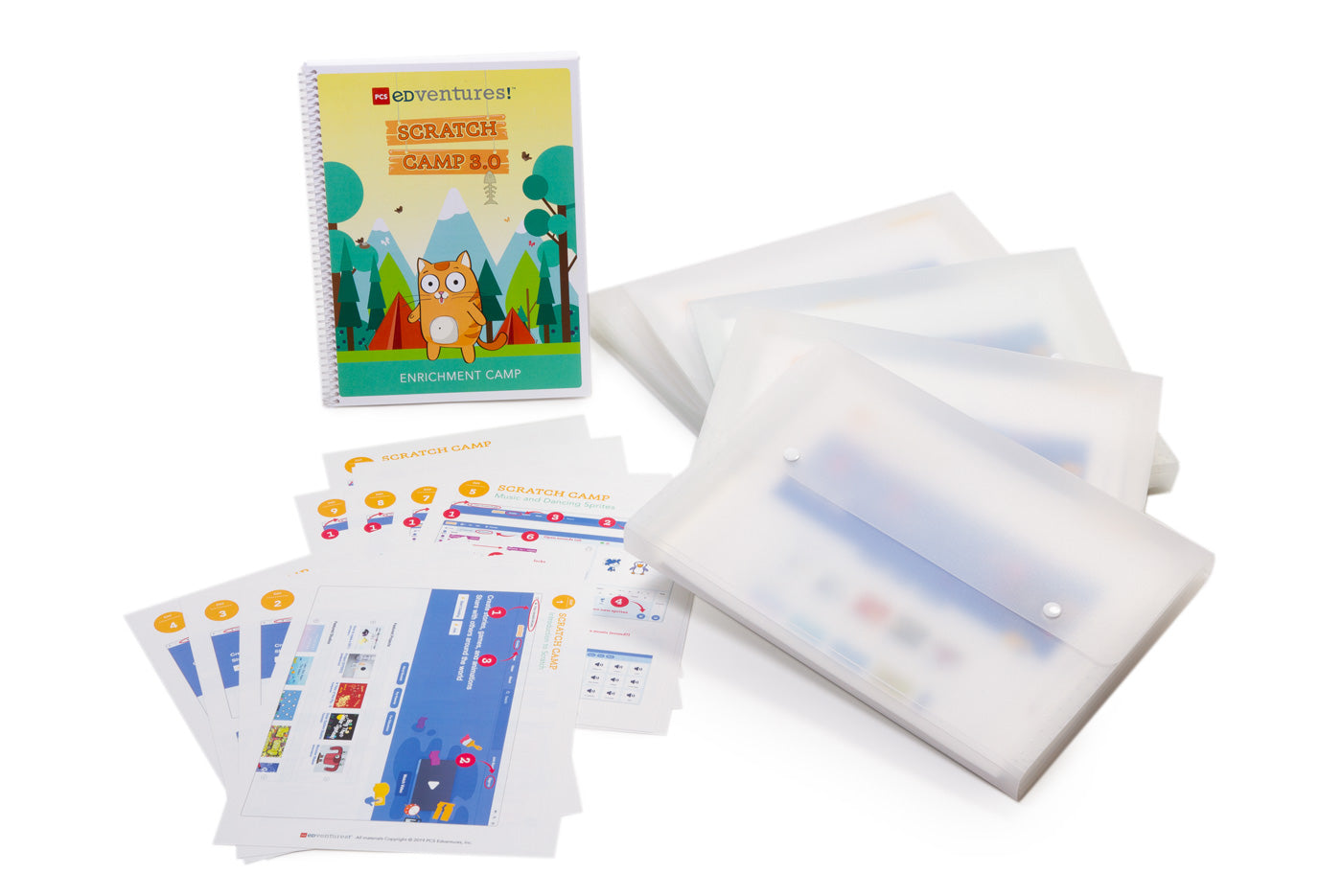
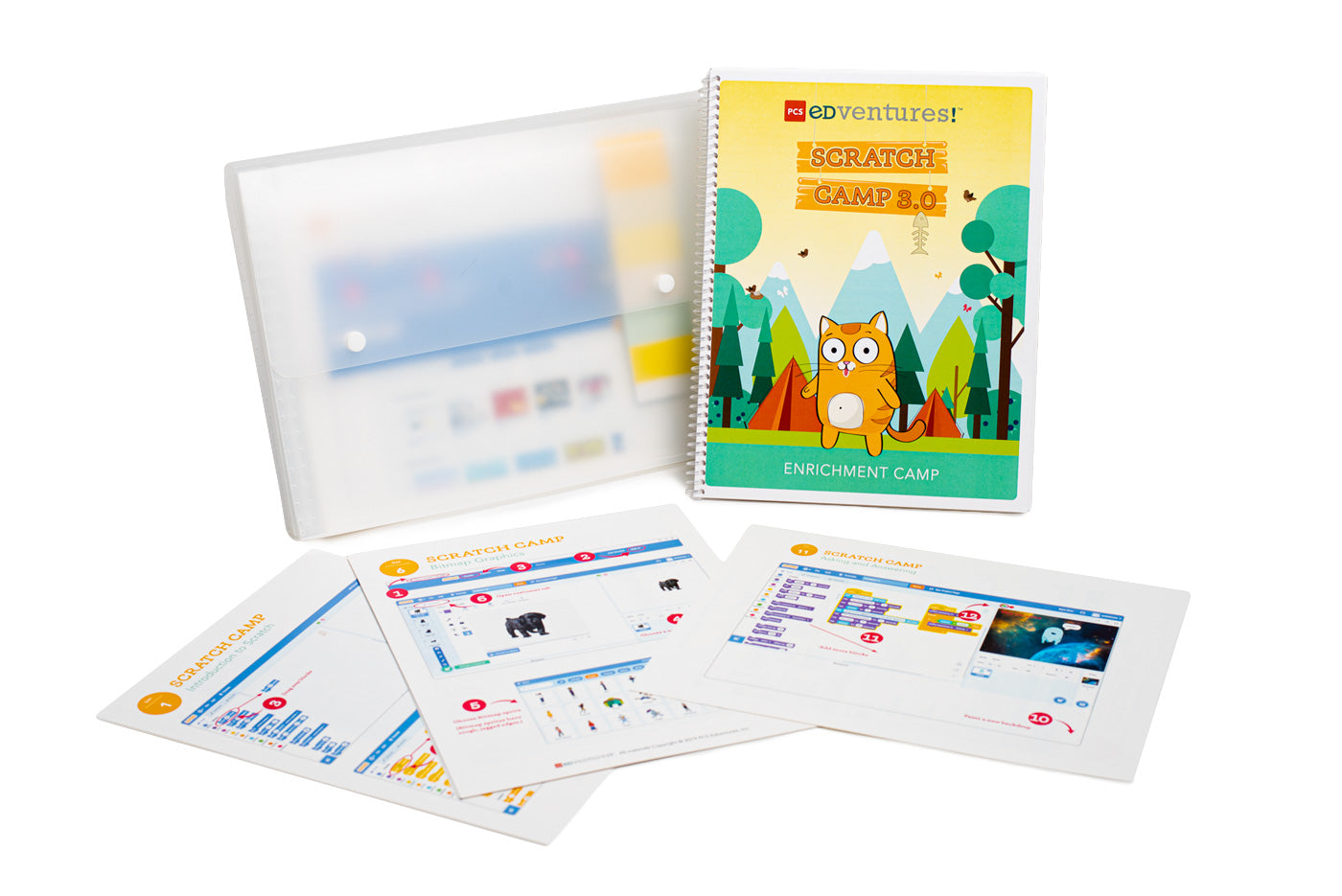
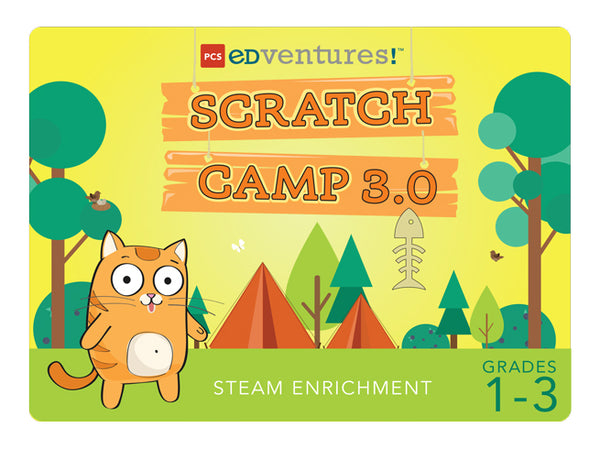
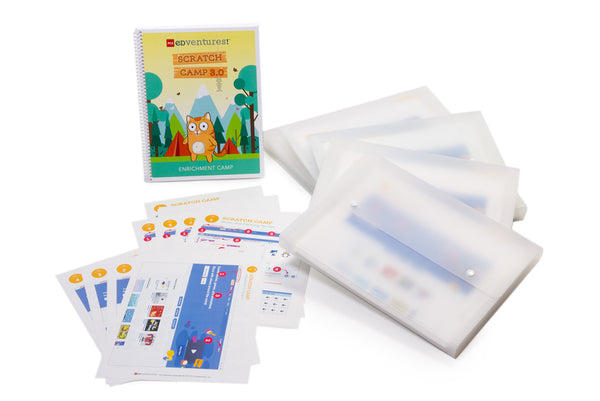
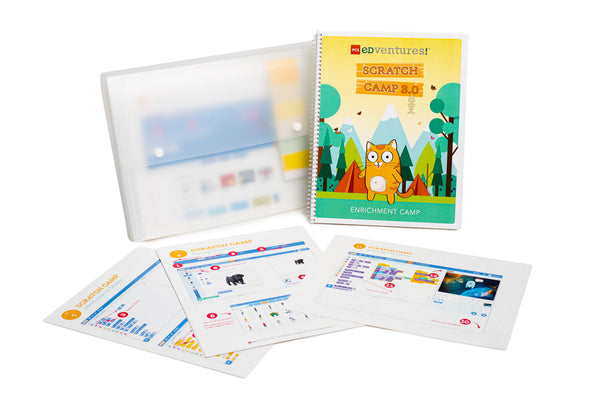



Scratch Camp
- Price
- 495 USD
Demystifying Computer Programming
Explore the magic of computer programming with Scratch, a free-to-use software developed by MIT’s best brains to encourage young learners to combine creative thinking with logic! With a cutting-edge application and a series of 12 scaffolded, one-hour projects, learners uncover the sensational world of coding. Every day, learners expand their skills through iterative thinking and problem-solving challenges as they build their very own interactive storyboards and games with audio, video, animated characters and more.
Scratch Camp’s reusable coding curriculum demystifies computer programming and gets young learners fired up about creating their own unique projects!
Grades: 1-3
Students: 30
Contact Hours: 12+
Subject Targets:
Technology, Coding, Math Connections
Reusability and Expansion:
- 100% Reusable: The materials in this program are 100% reusable. Just clean and reuse again and again.
Settings & Tech Requirements
Recommended Settings:
- Summer Camps
- Classrooms
- Out-of-School Time Programs
Tech Requirements:
- One device per student is recommended.
- Scratch is compatible with any Internet‐connected device, including desktops, laptops, iPads, Android tablets, and Chromebooks. Best when used with a video projector.
Curriculum Topics
Each Activity Includes:
- Schedule
- Topic Background Information & Vocabulary
- Assessment
- Optional Extension Activities
- Materials List
Curriculum Topics:
- Introduction to Scratch
- The Pen and Precise Motion
- Spirographs
- Multiple Events and a Multiplayer Game
- Music and Dancing Sprites
- Bitmap Graphics
- Speaking Sprites
- Costumes and Changing Seasons
- Vector Graphics
- Introducing If Statements
- Asking and Answering
- Animations
Professional Development
Product Orientation:
- Half-hour free webinar orientation for purchases of $500+
- One-hour free webinar orientation for purchases of $1000+
- Additional training available for purchase
Materials
Complete Program Includes:
Scratch Camp comes with all of the supplies needed for 30 students to complete 12 one-hour activities:
- Instructor Guide: 1
- Printed Student Pages: 30 sets
- Expanding File Folders: 5
- Access to the Digital Resource Portal
Standards & Alignment
Habits of Mind:
16 thinking habits developed by Art Costa and Bena Kallick to empower students to succeed in a 21st-century learning environment.
- Applying Past Knowledge to New Situations
- Creating, Imagining, Innovating
- Listening with Understanding and Empathy
- Managing Impulsivity
- Persisting
- Questioning and Posing Problems
- Responding with Wonderment and Awe
- Striving for Accuracy
- Thinking about Thinking
- Thinking and Communicating With Clarity and Precision
- Thinking Flexibly
- Thinking Interdependently
21st Century Skills:
A set of widely-applicable abilities essential for success in the information age.
- Communication and Collaboration
- Creativity and Innovation
- Critical Thinking and Problem Solving
- Finding Humor
- Flexibility and Adaptability
- Gathering Data Through All The Senses
- Information, Media, and Technology Literacy
- Initiative and Self-Direction
- Productivity and Accountability
- Social and Cross-Cultural Skills
© 2019 Battelle for Kids. battelleforkids.org. All Rights Reserved. Battelle for Kids was not involved in the production of this product and does not endorse it.
Common Core State Standards for Mathematics:
- CCSS.MATH.CONTENT.2.NBT.A.1 Understand that the three digits of a three digit number represent amounts of hundreds,tens, and ones; e.g., 706 equals 7 hundreds, 0 tens, and 6 ones.
- CCSS.MATH.CONTENT.4.MD.C.5 Recognize angles as geometric shapes that are formed wherever two rays share a common endpoint, and understand concepts of angle measurement.
- CCSS.MATH.CONTENT.4.MD.C.5.A
An angle is measured with reference to a circle with its center at the common endpoint of the rays, by considering the fraction of the circular arc between the points where the two rays intersect the circle. An angle that turns through 1/360 of a circle is called a “one- degree angle,”and can be used to measure angles. - CCSS.MATH.CONTENT.4.MD.C.5.B An angle that turns through n one-degree angles is said to have an angle measure of n degrees.
Common Core State Standards Initiative © Copyright 2010. National Governors Association Center for Best Practices and Council of Chief State School Officers. All rights reserved.
Next Generation Science Standards:*
- NGSS K-2-ETS1-1 Engineering Design
- NGSS 3-ESS2-1 Weather and Climate
* Next Generation Science Standards and NGSS is a registered trademark of WestEd. Neither WestEd nor the lead states and partners that developed the Next Generation Science Standards were involved in the production of this product, and do not endorse it.
About the Author
Colin Falconer
Colin has extensive experience writing STEM-centered curriculum for PCS Edventures! and Blocksmith, Inc. He is dedicated to teaching
unfamiliar ideas in an intuitive and comprehensive manner, while ensuring an engaging learning experience. Colin is thus a strong-proponent of gamified-learning and uses games to create
curriculum that is both memorable and fun. As an employee of Blocksmith, a Boise-based software startup, he leads development on its curriculum
and education initiatives.
Shipping Information
Payment and Return Policy
Thank you for choosing PCS Edventures! We want to make your shopping experience with us a pleasant one. The following is our general policy concerning payment, returns, product shipping, and warranties.
Payment Information
We accept Purchase Orders (POs)*, checks, VISA, MasterCard, American Express, and Discover as forms of payment. During payment processing, we will verify your billing and shipping address. Please be sure that you enter your information accurately.
*Purchase Orders are subject to review by PCS Edventures. We reserve the right to accept or reject any Purchase Order at our discretion.
Shipping
PCS Edventures does not include the cost of shipping in its product pricing. Your shipping rate will depend on your delivery location.
We ship through Federal Express or United States Postal Service. Please provide a physical address for shipping. We are unable to ship to PO Boxes.
If your order requires expedited shipping, please contact our office at sales@edventures.com or (208) 343-3110.
Tax
Sales tax is automatically applied to any transaction that will ship to the states listed below. If you are tax exempt, please contact us at sales@edventures.com or (208) 343-3110.
Idaho: Sales tax is added, unless proper documentation for your exempt status is provided. This is required by the State of Idaho.
California: Sales tax is added to all transactions. This is required by the State of California.
Washington: Sales tax is added to all transactions. This is required by the State of Washington.
Georgia: Sales tax is added, unless proper documentation for your exempt status is provided. This is required by the State of Georgia.
New Jersey: Sales tax is added, unless proper documentation for your exempt status is provided. This is required by the State of New Jersey.
United States Customers: Please provide your organization’s Tax Identification Number or tax-exempt certification form as described in IRC Section 501 (c)(3) of the Code.
Order Fulfillment
Many products are assembled and packaged after an order is received. Typical order fulfillment time is 2-5 business days from your order date.
The products listed on our website contain materials that may be discontinued by our vendors without notice. Lead times to receive materials from our vendors may extend significantly due to a variety of factors. A sales representative will contact you within 48 hours if your order has been impacted by these issues or any other reason.
If your order requires expedited shipping, please contact our office at sales@edventures.com or (208) 343-3110 so we can try to accommodate your request. If you need delivery outside the continental United States, please contact us for shipping costs. We do not ship to PO Boxes.
Partial Fulfillment
PCS Edventures products are designed to be ready-to-use and accessible for any educator. This often requires some components to be sourced from third-party vendors. Occasionally, this may cause delays in order fulfillment.
In such cases, orders may be partially fulfilled to meet deadlines. A PCS Edventures representative will contact you if your order is subject to partial fulfillment. After the initial shipment, any delayed components will be shipped to you as soon as possible.
Return Policy
To return a product, you must first obtain a Return Merchandise Authorization ("RMA") number from PCS Edventures. To receive an RMA number, contact PCS Edventures at (208) 343-3110 within fifteen (15) business days of receipt of your product(s). Returned items must be received by PCS Edventures within thirty (30) calendar days after issuance of the RMA number or the return right will be forfeited and the RMA number becomes null and void.
All returned items must be returned postage prepaid and insured by you, in original packaging, in "as-shipped" condition, unopened and with all parts, accessories, and written materials included.
PCS Edventures may charge a restocking fee for returned items of up to thirty percent (30%), depending on circumstances. There may also be a product damage or missing-item fee in an amount determined by PCS Edventures for any product that is damaged, or is missing the original box, contents, accessories, and/or manuals (i.e., any product not in "as-shipped" condition).
These fees will apply unless the item was defective or damaged when shipped, you received the wrong item, or the fee is prohibited by law.
If you paid by credit card, you authorize PCS Edventures to debit your credit card for the amount of any fees required by PCS Edventures pursuant to this Return Policy.
PCS Edventures Warranty Information
1. LIMITED WARRANTY. PCS guarantees our products with a 30-day limited warranty against material or workmanship defects and will accept any defective item for refund or exchange. Unused or defective merchandise may be returned within 30 days after purchase for an exchange. THIS IS THE ONLY GUARANTEE OR WARRANTY BEING OFFERED BY PCS RELATING TO THE PRODUCTS AND SERVICES YOU PURCHASE OR RECEIVE FROM PCS. PCS MAKES NO OTHER, AND EXPRESSLY DISCLAIMS ALL, REPRESENTATIONS, WARRANTIES AND CONDITIONS, WHETHER IN WRITING, IMPLIED, OR STATUTORY, INCLUDING ANY WARRANTY OF MERCHANTABILITY OR FITNESS FOR ANY PARTICULAR PURPOSE, OR ANY WARRANTY ARISING FROM COURSE OF DEALING OR USAGE OF TRADE. EXCEPT AS OTHERWISE COVERED BY THE LIMITED WARRANTY, PRODUCTS AND SERVICES PROVIDED BY PCS ARE PROVIDED "AS IS" AND WITHOUT WARRANTY OF ANY KIND BY PCS. Manufacturers of non-PCS branded products may provide other warranties. Warranty claims for non-PCS branded products will be handled by their respective manufacturers.
2. Exclusivity of Remedy; Limitation of Liability. YOUR SOLE AND EXCLUSIVE REMEDY, AND PCS' SOLE AND EXCLUSIVE LIABILITY, FOR ANY BREACH OF WARRANTY SHALL BE YOUR RIGHT TO RECEIVE A REPLACEMENT PRODUCT. IN NO EVENT SHALL PCS BE LIABLE FOR SPECIAL, INDIRECT, INCIDENTAL, CONSEQUENTIAL OR PUNITIVE DAMAGES, INCLUDING LOST PROFITS OR LOSS OF BUSINESS, EVEN IF IT HAS BEEN ADVISED OF THE POSSIBILITY OF SUCH DAMAGES, NOR SHALL THE AGGREGATE LIABILITY OF PCS, WHETHER IN CONTRACT, WARRANTY, TORT, PRODUCT LIABILITY, STRICT LIABILITY OR OTHER THEORY, ARISING OUT OF OR RELATING TO THESE TERMS OR THE PURCHASE OR USE OF ANY PRODUCTS EXCEED THE PURCHASE PRICE OF THE PRODUCT. ANY LEGAL ACTION AGAINST PCS FOR BREACH OF THESE TERMS OF SALE, INCLUDING ANY WARRANTIES, MUST BE INSTITUTED WITHIN ONE YEAR AFTER DELIVERY OF GOODS.
3. Governing Law. The warranty terms are governed by the laws of the State of Idaho and the state courts of Idaho.
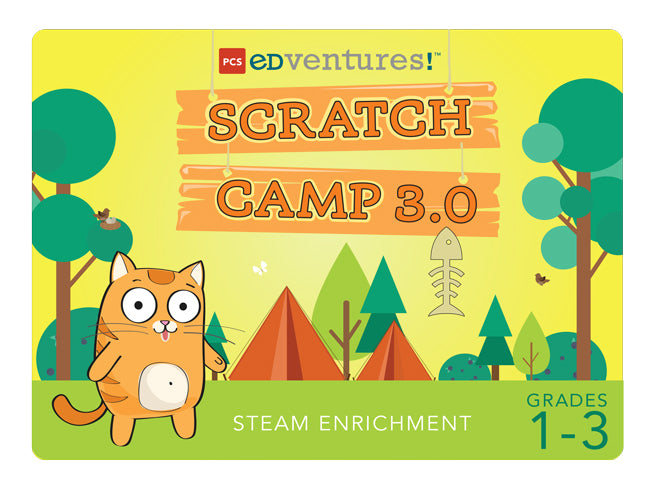
Scratch Camp
Pricing Options:
- Complete Program (Materials + Curriculum): 495.00 USD
Recommended Settings:
- Summer Camps
- Classrooms
- Out-of-School Time Programs
Tech Requirements:
- One device per student is recommended.
- Scratch is compatible with any Internet‐connected device, including desktops, laptops, iPads, Android tablets, and Chromebooks. Best when used with a video projector.
Each Activity Includes:
- Schedule
- Topic Background Information & Vocabulary
- Assessment
- Optional Extension Activities
- Materials List
Curriculum Topics:
- Introduction to Scratch
- The Pen and Precise Motion
- Spirographs
- Multiple Events and a Multiplayer Game
- Music and Dancing Sprites
- Bitmap Graphics
- Speaking Sprites
- Costumes and Changing Seasons
- Vector Graphics
- Introducing If Statements
- Asking and Answering
- Animations
Product Orientation:
- Half-hour free webinar orientation for purchases of $500+
- One-hour free webinar orientation for purchases of $1000+
- Additional training available for purchase
Complete Program Includes:
Scratch Camp comes with all of the supplies needed for 30 students to complete 12 one-hour activities:
- Instructor Guide: 1
- Printed Student Pages: 30 sets
- Expanding File Folders: 5
- Access to the Digital Resource Portal
Habits of Mind:
16 thinking habits developed by Art Costa and Bena Kallick to empower students to succeed in a 21st-century learning environment.
- Applying Past Knowledge to New Situations
- Creating, Imagining, Innovating
- Listening with Understanding and Empathy
- Managing Impulsivity
- Persisting
- Questioning and Posing Problems
- Responding with Wonderment and Awe
- Striving for Accuracy
- Thinking about Thinking
- Thinking and Communicating With Clarity and Precision
- Thinking Flexibly
- Thinking Interdependently
21st Century Skills:
A set of widely-applicable abilities essential for success in the information age.
- Communication and Collaboration
- Creativity and Innovation
- Critical Thinking and Problem Solving
- Finding Humor
- Flexibility and Adaptability
- Gathering Data Through All The Senses
- Information, Media, and Technology Literacy
- Initiative and Self-Direction
- Productivity and Accountability
- Social and Cross-Cultural Skills
© 2019 Battelle for Kids. battelleforkids.org. All Rights Reserved. Battelle for Kids was not involved in the production of this product and does not endorse it.
Common Core State Standards for Mathematics:
- CCSS.MATH.CONTENT.2.NBT.A.1 Understand that the three digits of a three digit number represent amounts of hundreds,tens, and ones; e.g., 706 equals 7 hundreds, 0 tens, and 6 ones.
- CCSS.MATH.CONTENT.4.MD.C.5 Recognize angles as geometric shapes that are formed wherever two rays share a common endpoint, and understand concepts of angle measurement.
- CCSS.MATH.CONTENT.4.MD.C.5.A
An angle is measured with reference to a circle with its center at the common endpoint of the rays, by considering the fraction of the circular arc between the points where the two rays intersect the circle. An angle that turns through 1/360 of a circle is called a “one- degree angle,”and can be used to measure angles. - CCSS.MATH.CONTENT.4.MD.C.5.B An angle that turns through n one-degree angles is said to have an angle measure of n degrees.
Common Core State Standards Initiative © Copyright 2010. National Governors Association Center for Best Practices and Council of Chief State School Officers. All rights reserved.
Next Generation Science Standards:*
- NGSS K-2-ETS1-1 Engineering Design
- NGSS 3-ESS2-1 Weather and Climate
* Next Generation Science Standards and NGSS is a registered trademark of WestEd. Neither WestEd nor the lead states and partners that developed the Next Generation Science Standards were involved in the production of this product, and do not endorse it.
Colin Falconer
Colin has extensive experience writing STEM-centered curriculum for PCS Edventures! and Blocksmith, Inc. He is dedicated to teaching
unfamiliar ideas in an intuitive and comprehensive manner, while ensuring an engaging learning experience. Colin is thus a strong-proponent of gamified-learning and uses games to create
curriculum that is both memorable and fun. As an employee of Blocksmith, a Boise-based software startup, he leads development on its curriculum
and education initiatives.




